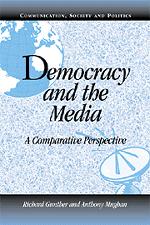Book contents
- Frontmatter
- Contents
- List of Contributors
- Acknowledgments
- 1 The Media in Democratic and Nondemocratic Regimes: A Multilevel Perspective
- 2 The Media and Politics in Spain: From Dictatorship to Democracy
- 3 Institutional Incapacity, the Attentive Public, and Media Pluralism in Russia
- 4 Democratic Transformation and the Mass Media in Hungary: From Stalinism to Democratic Consolidation
- 5 The Modernization of Communications: The Media in the Transition to Democracy in Chile
- 6 Media Influence in the Italian Transition from a Consensual to a Majoritarian Democracy
- 7 The United States: News in a Free-Market Society
- 8 Japan: News and Politics in a Media-Saturated Democracy
- 9 The Netherlands: Media and Politics between Segmented Pluralism and Market Forces
- 10 Great Britain: The End of News at Ten and the Changing News Environment
- 11 Germany: A Society and a Media System in Transition
- 12 The Political Impact of the Media: A Reassessment
- References
- Index
11 - Germany: A Society and a Media System in Transition
Published online by Cambridge University Press: 05 June 2012
- Frontmatter
- Contents
- List of Contributors
- Acknowledgments
- 1 The Media in Democratic and Nondemocratic Regimes: A Multilevel Perspective
- 2 The Media and Politics in Spain: From Dictatorship to Democracy
- 3 Institutional Incapacity, the Attentive Public, and Media Pluralism in Russia
- 4 Democratic Transformation and the Mass Media in Hungary: From Stalinism to Democratic Consolidation
- 5 The Modernization of Communications: The Media in the Transition to Democracy in Chile
- 6 Media Influence in the Italian Transition from a Consensual to a Majoritarian Democracy
- 7 The United States: News in a Free-Market Society
- 8 Japan: News and Politics in a Media-Saturated Democracy
- 9 The Netherlands: Media and Politics between Segmented Pluralism and Market Forces
- 10 Great Britain: The End of News at Ten and the Changing News Environment
- 11 Germany: A Society and a Media System in Transition
- 12 The Political Impact of the Media: A Reassessment
- References
- Index
Summary
The German case is of special interest in any study of the relationship between the mass media and democratic politics. The idea of political reeducation after the period of totalitarian Nazi rule was a core element in the (Western) Allies' restructuring of Germany after 1945, and the mass media played a highly significant role in their resocialization program. Thus, this chapter will discuss to what extent and how the German mass media have contributed to what Conradt (1980,263) has called a “remade political culture.” Its basic theme is that the media are not a political force in their own right. Rather, their importance, especially that of the electronic media, is contingent on the pattern of their interaction with political institutions and the political process at large. The chapter is divided into three sections. The first describes the German mass media system, with its distinctive combination of external pluralism of the print media and internal pluralism of the monopolistic public radio and television systems (Rundfunk). The second section looks at the dualization of this system brought about by the emergence in the 1980s of privately owned and organized radio and television. Precisely because public radio and television had always taken their constitutionally prescribed role of providing political information for the public very seriously, the resultant changes in program offerings and, eventually, in audience behavior represent a highly significant development in German politics.
- Type
- Chapter
- Information
- Democracy and the MediaA Comparative Perspective, pp. 375 - 401Publisher: Cambridge University PressPrint publication year: 2000
- 8
- Cited by



